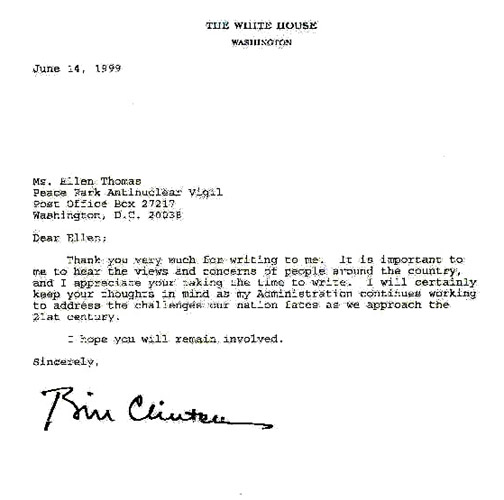Assuming the volunteer's story is true, Thomas wondered whether the Presidential Stamp Of Sanity is good news or bad.
____________
* Since 1981, at the vigil outside the White House, tourists repeatedly ask Thomas the same questions, "Why are you so afraid of nuclear weapons?" "Why do you do stay here all the time?"
Thomas has stock a answer for these repeated questions. "I'm not afraid of the weapons. Because the they only have one practical purpose -- to kill and destroy -- I just think they are evil. Because the United States has spent almost six trillion dollars on its' nuclear arsenal -- enough to give nearly $1,000 to every person on earth -- I also believe that the weapons are foolishly wasteful.
"I figure there is one of two possibilities, (a) either I'm totally out of my mind, or (b) the people who live across the street are out of their minds. If it's me who's out of touch with reality, I'd like to come to my senses. Figure the best way to determine where I might be out of touch is to expound my beliefs in public, and listen other people's critiques. However, if it's the people on the other side of the street who are crazy. Since they are your leaders, it seems that you and a lot of other people might be in a bad situation. So I stay here because I can't think of a better why to test my sanity."
"How long are you going to keep doing this?" Passersby often ask.
"Until I can think of something more productive to do, or until somebody can convince me that I'm crazy."
--------------------------------------
Afterword
* The following morning (June 13, 1999), curious about the volunteer's story, Ellen Thomas sent the following e-mail to President Clinton:
"Dear President Clinton,
"I'm told by one of our volunteers that
you paid him a visit at our signs outside your house last night.
I have no reason to doubt him. It warms me that you chose to visit
us; I'm sorry I wasn't there to greet you. I'm sure he did a
good job.
"Our volunteer tells me that you said that nukes and d.u. are bad, but economics and others dictate reality. I'm still shaken by
Friday's revelations about widespread proliferation of radioactive depleted uranium. Please step forward to apologize for
radioactive weapons and vow to work for the transformation of our society...."
On June 14th, the White House mailed Ellen the following reply
from President Clinton. This could be construed as confirmation
of the volunteer's story.



